#rashid ishtar
Explore tagged Tumblr posts
Text
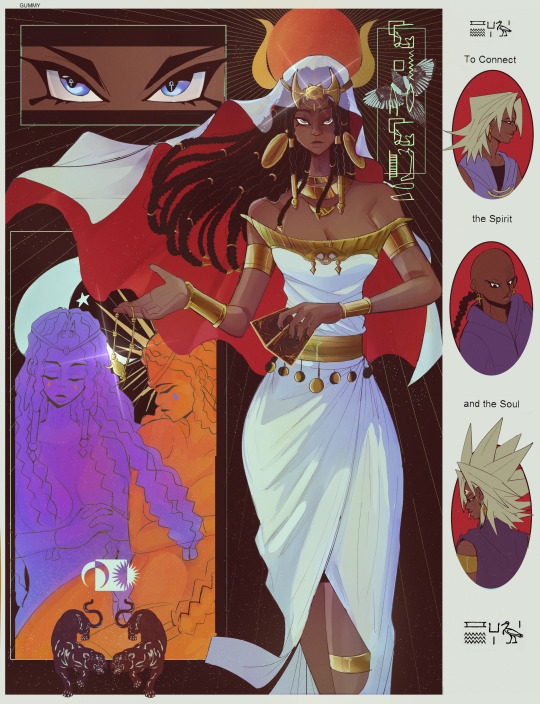
ISHIZU 🌕
#this took sooo long because of art block grahhh#anything for my wfie however#this is supposed to parallel with the yami marik one i made but idk if that's clear enough#yugioh#yugioh dm#ishizu ishtar#marik ishtar#yami marik#odion ishtar#rashid ishtar#malik ishtar#yami malik#ygo#ygo dm#etc etc#gummy draws#my art
914 notes
·
View notes
Text
Yugioh DM english localized names list I have no idea who this is gonna be useful for but it's out there now
Feel free to tell me if I missed something or got something wrong.
Jonouchi Katsuya: Joey Wheeler
Anzu Mazaki: Téa Gardner
Hiroto Honda: Tristan Taylor
Other Yugi: Yami
Ryuji Otogi: Duke Devlin
Mai Kujaku: Mai Valentine
Shizuka Kawai: Serenity Wheeler
Pegasus J. Crawford: Maximillion Pegasus
Insector Haga: Weevil Underwood
Dinosaur Ryuzaki: Rex Raptor
Ryota Kajiki: Mako Tsunami
Esper Roba: Espa Roba
Ghost Kotsuzuka: Bonz
Sugoroku Mutou: Solomon Muto
Rishid Ishtar: Odion Ishtar (I'm like 90% sure "Rishid" is also a failed localization of the Japanese spelling of "Rashid" but I'm mostly chosing not to be annoying about the Ishtars' names here)
Rebecca Hopkins: Rebecca Hawkins (Arthur Hopkins got the same last name change)
Miho Nosaka: Melody
Tomoya Hanasaki: Lint Greendale
Isono: Roland
Amelda: Alister
Cyndia Pegasus: Cecelia Pegasus
Princess Mary: Princess Adena
Pandora: Arkana
Doll/Pantomimer: Strings/The Quiet One
Mask of Light: Lumis
Mask of Darkness: Umbra
Mei: Para
Kyū: Dox
Player Killer of Darkness: PaniK
Imitator of Death: Mimic of Doom
Mr. Crocketts: Croquet
Saruwatari: Kemo
Soichiro Ota: Nezbitt
Chikuzen Ouka: Johnson
Konosike Oshita: Gansley
Kogoro Daimon: Leichter
Shuzo Otaki: Adrian Randolph Crump III
Takaido: Sid
Satake: Zygor
Juan: Aaron
Tom: Sam
Miruko: Mikey/Micheal
Barry Ginger: Balfry Ginger
Theodore Iwalaos: Totani Ialos
Essel Jansen: Shane Jordan
Mr. Morita: Coah Morty
Tetsu Ushio: Tetsu Trudge
Blankey: Lucky
Sunny: Skye
#ik the ddm gba game had localized names for like EVERY obscure manga character but i cant play it without dissociating#so if anyone wants to make a list and hmu. hey.#yugioh#yugioh duel monsters#ygo dm#ygo#jonouchi katsuya#anzu mazaki#honda hiroto#yami yugi#ryuji otogi#mai kujaki#shizuka kawai#pegasus j crawford#insector haga#dinosaur ryuzaki#ryota kajiki#esper roba#ghost kotsuzuka#sugoroku mutou#rishid ishtar#miho nosaka#tomoya hanasaki#isono#rebecca hawkins#cyndia pegasus#i dont think anyone elses names are gonna be helpful for tagging
26 notes
·
View notes
Note
what about top 6 characters to have a tea party with ☕️🍰
mmm probably the same as the picnic… i know they throw banger tea parties… BUT i will add on to the list with Alucard castlevania, freed justine, isis ishtar, and rashid ishtar
4 notes
·
View notes
Text
Abandonshipping - Noa Kaiba x Yami Marik
Afterlifeshipping - yami yugi x yami bakura x seto kaiba
Aloneshipping - mai valentine x kisara
Anachroshipping - mana x Rebecca Hopkins
Antishipping - yami bakura x dark magician
Apocalypseshipping - seto kaiba x yami yugi x yami marik x yami bakura
Ascendshipping - atem x mahad x seto kaiba
Aspectshipping - marik Ishtar x the winged dragon of Ra
Atomicshipping - Marik Ishtar x Noa Kaiba
Balanceshipping - Mahad x Karim
Bannedshipping - mahad x illusion Magician
Beautyshipping - harpies lady x mai valentine
Blastshipping - yami yugi x seto kaiba x yami marik
Bugshipping - Noah kaiba x weevil underwood
Calamityshipping - atem x thief king bakura x zorc necrophades
Captureshipping - seto kaiba x dark magician
Carefulshipping - mahad x Spiria
Commandshipping - yami marik x winged dragon of ra
Completeshipping - Kisara x Atem
Continueshipping - mahad x dark magician
Conquestshipping - Seto Kaiba x dark lord
Corpshipping - mokuba kaiba x Rebecca Hopkins
Cornershipping - Yugi Muto x Dark Lord
Digshipping - mokuba kaiba x Rex raptor
Divineshipping - yami yugi x seto kaiba x marik Ishtar
Edenshipping - atem x diabound
Eternalshipping - seto kaiba x mahad
Faithshipping - Rashid Ishtar x mahad
Fealtyshipping - Dark Magician x Gaia
Giggleshipping - dark magician girl x Rebecca Hopkins
Goddessshipping - Isis x BEWD
Hieressshipping - Candia Pegasus x mai valentine
Indecentshipping - priest seto x atem x mahad x thief king bakura x dark lord
Laborshipping - pandora x dark magician girl
Lustshipping - atem x mahad x thief king bakura
Mergeshipping - priest set x Karim
Negativeshipping - zorc necrophades x mahad
Nextshipping - serenity wheeler x mokuba kaiba x Rebecca Hopkins
Opposeshipping - Mahad x Diabound
Oracleshipping - Kisara x Pegasus
Overprotectshipping - Mahad x Marik Ishtar
Partshipping - dark magician x illusion magician
Playshipping - Noa kaiba x dark magician girl
Politishipping - priest seto x atem x mahad x thief king bakura
Prayershipping - Rishid x winged dragon of ra
Prettyshipping - marik Ishtar x Miho nosaka
Prisonshipping - red dark magician x marik Ishtar
Pulseshipping - seto kaiba x obelisk the tormentor
Realmshipping - atem x aknadin x dark lord
Redshipping - thief king bakura x Red Dark Magician
Reperationshipping - Thief King Bakura x Seto Kaiba
Rescueshipping - Yami Yugi x Red Dark Magician
Revelationshipping - zorc necrophades x thief king bakura
Ruinshipping - atem x zorc necrophades
Shearshipping - Pandora x Red Dark Magician
Sinshipping - priest seto x thief king bakura x mahad
Solarshipping - yami marik x marik Ishtar x winged dragon of ra
Sorrowshipping/Exwifeshipping - Kisara x Cyndia
Suffershipping - seto kaiba x yami bakura x marik Ishtar
Throneshipping - atem x marik Ishtar x yami marik
Trickshipping - Mai Valentine x Catherine
Unholyshipping - seto kaiba x yami bakura x yami marik
Unsignshipping - Damaged BEWD x Desher
Untimelyshipping - Cyndia Pegasus x Catherine x Mai Valentine
Vigilshipping - mahad x yami marik
Wingshipping - blue eyes white dragon x Spiria
Every time I make a joke about ygo ship names someone ends up mentioning yet another ship name so obscure it's not even on any of the masterlists I've learned to use, and each time all I can do is nod solemnly to myself and think "Ah, the well goes even deeper than we thought."
#I do not ship all of these but they've been living in my notes for ages#Some of these might have other names but I have seen these#So#Yay yugioh fandom
159 notes
·
View notes
Photo


Lesbian flag but it’s color picked from Odion Ishtar!
41 notes
·
View notes
Photo
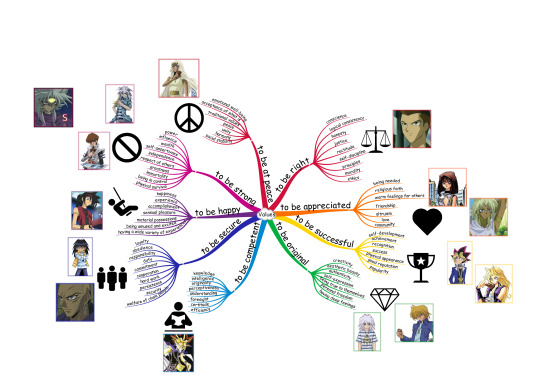
[ID: A chart describing the core values of each of the nine Enneagram personality types with YuGiOh characters correlated to each of the types.]
YuGiOh Enneagram Analysis, Part #2
This is a continuation in which we finally get to the exciting part: in-depth character analysis of all the characters pictured above based on the Enneagram Personality Types! The previous post lists all of the types and their traits and how to read various things about the Enneagram Chart.
Contents
I suggest you use CTRL+F if you’re only interested in specific people, because I do not feel like trying to code anchor points into this post x.x
Mutou Yugi
Yami Yugi (Atem)
Mazaki Anzu
Jounouchi Katsuya
Honda Hiroto
Bakura Ryou
Yami Bakura
Kaiba Seto
Kaiba Mokuba
Marik Ishtar
Odion Rashid Ishtar
Isis Ishtar
Kujaku Mai
Otogi Ryuji
Character Profiles
Mutou Yugi - Type 3: The Achiever (3w2)
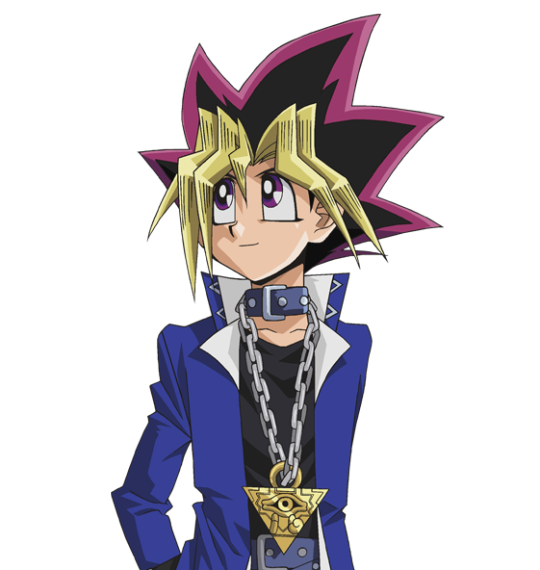
Yugi is The Achiever. At first, one might think he is too gentle and kind most of the time for achievement and success to be the core of his personality or central to his greatest desires. But that’s only because we link the idea of “success” or “achievement” too much with capital and material wealth.
Yugi doesn’t care that much about money, and while he likes to collect games and things that bring him joy, he does not care about accumulation for its own sake. For a lot of his life, Yugi put up with being overlooked and underestimated by friend and bully and rival and anyone else he met. What he desired to achieve by solving the Millennium Puzzle was to have more friends! The important bit there is that he wanted success, to obtain a result, even if that result was a wish for something with social rather than material value.
As a Type 3, Yugi is image-conscious, but it comes up from behind. He is not particularly vain as he doesn’t have a tremendous amount of self-confidence about his appearance. It may be a gag, but early on, Yugi is so short that he is sometimes mistaken for an elementary school student. He knows he looks young and small.
Nevertheless, Yugi expresses himself in whatever ways he can. It’s up for debate whether he wears a little bit of guyliner and whether his hair just grows that way because he has Main Character Disease. Even if we accept that his hair and big eyelashes just look like that, Yugi wears a collar-like choker and black clothing and buckles wherever he can, even under his school uniform. If this aesthetic was motivated from a standpoint of flaunting the school rules in order to rebel, I don’t think he would wear them underneath so inconspicuously. Instead, it would seem that his little under-his-clothes fashion expression is something he does for himself because there is something about it that makes him feel better or happy about his physical appearance or self-perception.
Even if Yugi does not use his intriguing fashion preferences to get attention, it is part of a greater set of traits that indicate that Yugi has a fear of being unnoticed, undervalued, or worthless to the people around him. To counteract this, he desires affirmation and distinction from others. He hopes to impress others and wants to be worthy of admiration.
A side note: A friend of mine who knows far more about Japanese fashion history than I do suggested that perhaps Yugi is interested in visual kei aesthetics, though he obviously never takes it up to eleven the way the performers of the related music did.
Reactions:
Yugi’s first impulse is to react based on his feelings.
If something separates Yugi from being his true self, having his basic needs met, or seeing a way forward, his most prominent negative emotional response is likely to be shame.
Stress Point:
When Yugi is cornered, in a bad mood, hurt, or otherwise driven toward putting up a front, he is likely to display negative manifestations of Type 9 - The Peacemaker. This could mean that the Peacemaker traits such as being agreeable and complacent could devolve into capitulation, undesired or inappropriate submission or surrender. At his worst, Yugi is afraid of being left alone.
Growth Direction:
As Yugi experiences positive growth, he will become more like Type 6 - The Loyalist during his times of transition. This could mean that he will become more secure in his attachments to his friends, becoming less fearful that he could lose them due to one false step. He will also likely become more determined to stick with a cause, not to back down, and to be responsible.
Wing:
I chose Wing Type 2 - The Helper for Yugi because he is very emotionally warm. He values friendship, and he wants to contribute good to the lives of his friends. He is willing to accept almost anyone as a friend and is almost too accepting of giving people second chances.
The rest of the profiles listed above are under the Read More to save your scrolls. Please check them out!
Yami Yugi (Atem) - Type 5: The Investigator (5w6)

Please note that this analysis is based on the person he is and develops into during his time in the modern world more than anything about him prior to his amnesia in the ancient past.
Atem is The Investigator. Now, I know you might be thinking that this is a cop-out. Of course Atem is “the investigator” because he spends a good part of the series having the primary motivation of finding out more about his identity and his past. While that does play an appropriately large role in my assessment of him as having this primary personality type, that’s not the only reason!
Even when the Spirit of the Millennium Puzzle first awakened and had no conception of his identity and no scruples as to how he might develop or achieve his goals, he looked for a way to be useful and stabilize himself within his new environment. Being a past pharaoh with no understanding of his present circumstances didn’t stop him from striving to create an environment in which he was in control and one which he understood.
In spite of his apparent violent impulses and easily-stoked, simmering anger, he begins to protect what he understands as Yugi’s best interests and needs. While one might argue that protecting his new host body might be a simple pragmatic decision, it is apparent that Atem learns from Yugi and his interactions with others even before Yugi knows who or what Atem is, or even that he is there at all.
Contrasted with Yami Bakura, Atem starts out with more respect for Yugi’s ownership of his own body. While he certainly doesn’t ask permission to challenge Yugi and friends’ would-be assailants to Shadow Games, he doesn’t start to try and establish his own life beyond these excursions into the driver’s seat that are meant to protect other people. Otherwise, he holds himself back from much interaction with the modern world, even as he develops an emotional attachment to Yugi and his friends.
This would seem to indicate that Atem, as the Spirit of the Millennium Puzzle, feels the need to learn more and only really feels comfortable in environments he can understand well.
In being so good at playing established games and making them up, Atem is very in-his-head (cerebral) even when he is interacting and in-the-moment. He is an intense person who takes most decisions he makes seriously, whether it is agreeing to wager life against life in an instant or taking great care to make the right choice.
Atem fears (or hates) being helpless (trapped), useless, or incapable of doing anything about his or others’ circumstances.
Reactions:
Atem’s first impulse is to react based on his thought processes.
If something separates Atem from being his true self, having his basic needs met, or seeing a way forward, his most prominent negative emotional response is likely to be fear.
Stress Point:
When Atem is cornered, in a bad mood, hurt, or otherwise driven toward putting up a front, he is likely to display negative manifestations of Type 7 - The Enthusiast. This fits Atem perfectly, because when he is stressed after having been trapped in a puzzle for 3000 years, he turns everything into an adrenaline-seeking game. He was quick to act and slow to think, much more spontaneous than he otherwise would tend to be. He was reckless. At his worst, Atem is afraid of being deprived or in pain.
Growth Direction:
As Atem experiences positive growth, he will become more like Type 8 - The Challenger during his times of transition. This could mean that he will become more confident that he can take his time and learn the lay of the land. It means that he will approach the need to win with positive decisiveness and willpower. He will choose worthwhile confrontations, rather than picking any petty fight at random to defend himself and his perceived encroached territory.
Wing:
I chose Wing Type 6 - The Loyalist for Atem because when he is in control of himself, he tends to be more reserved, even to the point of being anxious about interacting in any way that does not seem familiar and comfortable. Atem becomes much more responsible as time goes on, and when he slips up and falls back on his worse instincts, he tends to pay for it and show regret. Plus, it’s in the name. He became loyal to Yugi and his friends even before he had been properly introduced.
Mazaki Anzu - Type 2: The Helper (2w1)

Used a manga picture only because her anime hair is slightly worse imho.
Anzu is The Helper. Contrary to popular view of side-character or female-character status, particular in shounen series of this era, this does not mean that Anzu lives to help others alone. As a Type 2, she also has high expectations of those around her, for good or ill.
Anzu wants to be loved, and she wants to be in a position to express her true feelings (including love) to others. She wants to be respected as she is in the moment, and this might make her tend to resist criticism or to recognize reckless or manipulative behavior in her worse moments. She can be possessive of her loved ones, her goals, and her space, just as much as she can be generous.
Anzu can be selfish, but most of the time, she is interested in community. Of course, we know from all the memes how much friendship means to her, and she also cares about doing the right thing for others even if it doesn’t come easily. She wants the opportunity to be her authentic self, and she wants to facilitate others being their authentic selves. She has a tendency to expect people to return favors in kind, even if there isn’t a reason to believe that the other person understands or accepts her expectation. She is the queen of well-deserved guilt trips.
Anzu’s desire to go to New York, to be a dancer, and to receive recognition for her talents is part of a desire to be vindicated in her claims about herself. She believes that she can do it, and she wants to make others believe, too, no matter how much of a sunk cost it might seem at times.
Anzu fears being unworthy of love, being unwanted or unworthy of acceptance.
Reactions:
Anzu’s first impulse is to react based on her feelings.
If something separates Anzu from being her true self, having her basic needs met, or seeing a way forward, her most prominent negative emotional response is likely to be shame.
Stress Point:
When Anzu is cornered, in a bad mood, hurt, or otherwise driven toward putting up a front, she is likely to display negative manifestations of Type 8 - The Challenger. She will be wilful and even manipulative to keep control or engineer control of her situation. A good example of this might be the ways in which she tried to make Yami Yugi appear in the manga shortly after she realized he had an ‘other self.’ Hormones are a hell of a drug.
Growth Direction:
As Anzu experiences positive growth, she will become more like Type 4 - The Individualist during her times of transition. This could mean that she will become less dependent on external validation to maintain her sense of worth to others. She will balance finding herself with her desire to be loved, establishing a stable identity outside and alongside her loved ones.
Wing:
I chose Wing Type 1 - The Reformer for Anzu because, most of the time, she values ethics and morality as she perceives them. However, she is more than willing to break unjust rules when she feels there is a good enough reason. She wants to be a principled person, but she is not a blind follower.
Jounouchi Katsuya - Type 4: The Individualist (4w3)
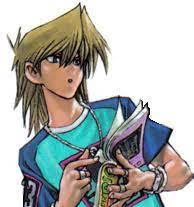
Let’s keep going with manga art for him, because this one is cute.
Jounouchi is The Individualist. I want to copy-paste the little blurb about this personality type from Part 1, because I feel like picking it apart for Jounouchi is the best way to prove my point.
Expressive, Dramatic, Self-Absorbed, and Temperamental
Basic Fear: That they have no identity or personal significance
Basic Desire: To find themselves and their significance (to create an identity)
Key Motivations: Want to express themselves and their individuality, to create and surround themselves with beauty, to maintain certain moods and feelings, to withdraw to protect their self-image, to take care of emotional needs before attending to anything else, to attract a “rescuer.”
First, Jounouchi changes his tune so quickly with Yugi when Yugi rescues him and shows that he cares in spite of Jounouchi’s hurtful behavior toward him. He is capable of very quickly changing his mind when he feels he’s been given a reason to.
In the beginning of the story, Jounouchi is self-absorbed because he is angry at the world. He doesn’t like himself until he is given a clear opportunity to show that he can be someone who does the right thing. He does not seek others’ approval directly, but he needs to see the mirror image of himself as someone else sees him to help anchor his sense of identity. He fears being absorbed into his background and upbringing. He probably fears that there is some inescapable pipeline to becoming a man like his father.
When he becomes friends with Yugi, he changes rapidly to channel his penchant for drama and a bit of aggression into defending Yugi and what he perceives as good causes. He has very intense emotions he expresses primarily through actions, demonstrating how he feels. However, if he has to give account for himself, he might run away or find a way to show rather than tell.
Jounouchi doesn’t mind or even likes to follow in others’ footsteps but leave his own, unique mark where he goes.
Reactions:
Jounouchi’s first impulse is to react based on his feelings.
If something separates Jounouchi from being his true self, having his basic needs met, or seeing a way forward, his most prominent negative emotional response is likely to be shame.
Stress Point:
When Jounouchi is cornered, in a bad mood, hurt, or otherwise driven toward putting up a front, he is likely to display negative manifestations of Type 2 - The Helper. How can being the Helper be expressed negatively? Well, it could be that a Type 2′s traits of being demonstrative and possessive could find their way out in ugly ways. Another example is that a Type 2′s biggest fear is that they may be unworthy of love. Jounouchi practically admits that one reason he fell into bullying others was because he did not think he was worth anything, and he was almost looking for confirmation of it or to make another share in his misery.
Growth Direction:
As Jounouchi experiences positive growth, he will become more like Type 1 - The Reformer during his times of transition. This could mean that he will become more concerned with developing a consistent sense of justice, right and wrong, ethics, etc., and that he will choose to fight for those things. He will value being honest with and about himself and others.
Wing:
I chose Wing Type 3 - The Achiever for Jounouchi because he finds such a positive outlet for himself through getting into games with Yugi. We also know that he enjoys building models out of kits. He likes to accomplish things with clearly-defined goals, even if he made them up, and he would really like it if he could be recognized for his efforts, even if that isn’t his primary goal in life.
Honda Hiroto - Type 1: The Reformer (1w9)

You might think that Honda doesn’t have a personality in the anime, some of the time. However, this assessment is based on things that are established about him in the manga and how he conducts himself when he is allowed to do anything.
Honda is The Reformer. This might be a bit hard to buy from the name, given how Honda doesn’t tend to take the reins in most of the stories he is in. However, it’s important to remember that - perhaps more than Yugi’s other day-to-day friends - Honda is kind of a guest-star. He is the kind of person who is likel to be starring in his own show that nobody knows about, even if it isn’t that exciting.
We know he has at least one sister and that he was conscripted into keeping his nephew for a day once. In spite of the fact that this was played mostly for laughs, it shows that he is willing to do the right or expected thing. Takahashi’s descriptions of him in the manga opening pages also describe him as being ‘chivalrous’ in his natural state, and it would seem that he largely felt bad if bullying people with Jounouchi went too far.
Honda makes an effort to make things right when he knows how, even if he doesn’t always know. Honda tries to listen to his conscience, even if he makes choices that are off the beaten path of what society expects of him. He has a strong personal ethic, even if he sometimes compromises it for one reason or another.
Reactions:
Honda’s first impulse is to react based on his gut feeling (instinct).
If something separates Honda from being his true self, having his basic needs met, or seeing a way forward, his most prominent negative emotional response is likely to be anger/rage.
Stress Point:
When Honda is cornered, in a bad mood, hurt, or otherwise driven toward putting up a front, he is likely to display negative manifestations of Type 4 - The Individualist. He may start to put his whims or trying to make an impression ahead of his sense of right and wrong. He might feel he needs to define himself more than he needs to stand for something.
Growth Direction:
As Honda experiences positive growth, he will become more like Type 7 - The Enthusiast during his times of transition. This could mean that he will loosen up and participate in his friends’ games more often. He might become more adventurous and take an interest in experiencing new things regardless of whether they “make sense” or are the “right thing” to be doing in the moment.
Wing:
I chose Wing Type 9 - The Peacemaker for Honda because while he sometimes participates in “aggressive negotiations,” he seems to prefer when violence serves what he thinks is a greater purpose. He wants to set things right, and he does seem to value peaceful, easygoing time as much as he likes the adrenaline rush.
Bakura Ryou - Type 4: The Individualist (4w5)

Bakura Ryou is a different manifestation than Jounouchi of The Individualist. This goes to show that people with similar desires or needs can have very different behavior. They can also have different priorities. While Jounouchi is the kind of person who will aggressively seek after what he wants, Ryou is more gentle, passive, or elusive.
He values aesthetic beauty, and he loves stories. He is interested in dark aesthetics much the way Yugi is, though his is more focused on spiritualist or Euro-centric occultism. He likes Ouija boards, and he is interested in the possibility of communication with the dead. This is probably owed to the fact that he takes comfort in writing letters to his dead mother and sister on occasion.
Ryou is an emotional person who has deep feelings. He cares greatly for his friend, and he wants to protect them. However, he has feelings of helplessness. One could attribute this to the way in which the Spirit of the Millennium Ring controls him and does not directly interact with him very often while having so much control over his body and life. One could also interpret him as being easily manipulated by promises of support and help. If given more choice, he might act on whims quite often.
He enjoys creativity and self expression as demonstrated through his enjoyment of being the DM in Western Tabletop RPGs. He also desires more personal freedom than his circumstances have allowed him to have. He probably feels quite out of control of his own life and may have even before he was particularly in touch with Yami Bakura due to the loss of half his family at such a young age.
Reactions:
Ryou’s first impulse is to react based on his emotions.
If something separates Ryou from being his true self, having his basic needs met, or seeing a way forward, his most prominent negative emotional response is likely to be shame.
Stress Point:
When Ryou is cornered, in a bad mood, hurt, or otherwise driven toward putting up a front - separated from Yami Bakura’s personality and soul - he is likely to display negative manifestations of Type 2 - The Helper. He may take on the role of a social engineer or otherwise manipulate people. He may become evasive about telling or believing the truth due to a fear of being unworthy of love or acceptance if those he cares for knew the truth. He may become people-pleasing in a way that is not true to his core personality for personal gain or survival.
Growth Direction:
As Ryou experiences positive growth, he will become more like Type 1 - The Reformer during his times of transition. This could mean that he will begin to care more for the overarching morality of the situation than how he is to survive the situation without greater losses.
Wing:
I chose Wing Type 5 - The Investigator for Ryou because he is interested in mysteries and the occult. He enjoys knowing something people don’t and may look to it as a way to feel special or important. He is fascinated with death and knowing what comes after. He wants to find hope in that. He also may feel a desire to be more competent and to better understand what he is going through with Yami Bakura without losing anything as a result.
Yami Bakura - Type 8: The Challenger (8w7)
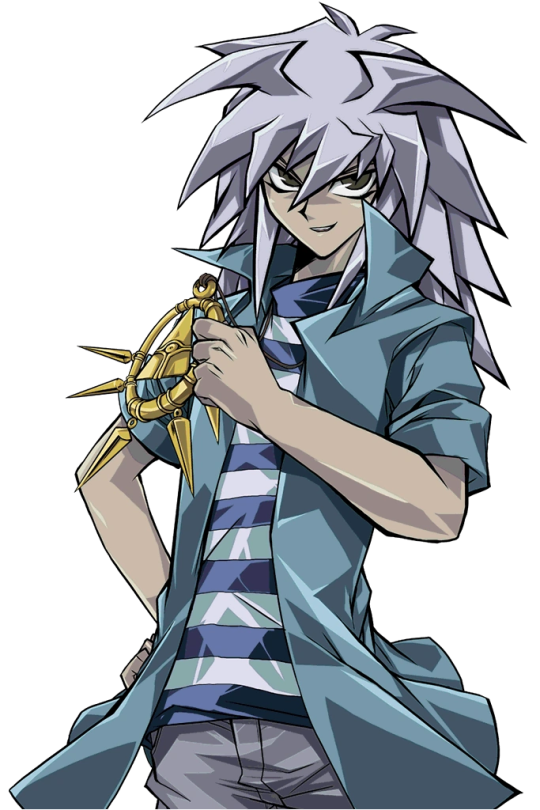
Yami Bakura, the Spirit of the Millennium Ring who is the soul of Thief King Bakura from Ancient Egypt, corrupted or attached to a piece of the soul of Zorc, may be a complicated entity, but he does have a mostly-stable personality through most of the series. He is The Challenger.
Even prior to his dealings with Zorc, Bandit King Bakura was invested in his own physical survival. He was very angry about the fact that his village had been sacrificed in order to help create the Millennium Items. He desired revenge against the royal family. He was influenced by the vengeful spirits of his massacred people, even before he came into contact with the chaotic, destructive entity of Zorc.
While it would seem that “Yami Bakura,” as the Spirit of the Millennium Ring, remains rather unaware of how his connection to Zorc is destructive to him. He has the dual motivations of summoning Zorc and destroying Atem because as the King of Thieves, he wanted to destroy Pharaoh Atem for his guilt by association with his uncle and father and Zorc desires for all the fragments of his soul to be together and whole once again so that he may, well, destroy stuff.
One could say that all parts of this Bakura are invested in power and influence. He is willing to run a much more subtle and long series of cons on Yugi, Atem, and the others, because he seems to derive some pleasure out of tricking them. He wants to be in control of his own destiny and even the destinies of others, due to his deep-seated resentments.
He fears death and wants a kind of immortality, no matter what he knows about himself or his own underlying motivations. Unlike Atem, the other Spirit attached to a Millennium Item and, therefore, a host, Yami Bakura values independent action to the point that he largely disregards Bakura’s desires or opinions on his actions, if Ryou is even aware of them at all.
Reactions:
Yami Bakura’s first impulse is to react based on his gut feeling or primal instinct.
If something separates Yami Bakura from being his true self (inasmuch as he has ‘one’), having his basic needs met, or seeing a way forward, his most prominent negative emotional response is likely to be anger/rage.
Stress Point:
When Yami Bakura is cornered, in a bad mood, hurt, or otherwise driven toward putting up a front, he is likely to display negative manifestations of Type 5 - The Investigator. One might argue that Yami Bakura’s base personality was that of an already stressed Type 2 - The Helper, but it is hard to say when his life was torn apart at such an early age. The negative aspects of a Type 5 may account for how secretive he is. It could also define the unhealthy relationship he has with Ryou as a host. He keeps both of them isolated to a great degree, and he thinks he knows what is best and refutes any possibility of the contrary. He wants to be one step ahead, and he is innovative in the ways he plots against the Pharaoh and others.
Growth Direction:
If Yami Bakura were ever to experience positive growth, he would become more like Type 2 - The Helper during his times of transition. This could mean that he would begin to care more about the thoughts and feelings of others. While it would not be healthy for an individual to find their entire identity in the perceptions of others, it is also unhealthy for an individual to care nothing for the thoughts and feelings of others. He may become more interested in proving himself and showing who he is and wants to be to others.
Wing:
I chose Wing Type 7 - The Enthusiast for Yami Bakura because he seems to be in touch with his senses (or Ryou’s body’s senses, if you want to get technical) when he is in control. One need only observe him eat or thrill when a plan of his begins to go into motion to see that he greatly enjoys things in spite of his cluster of negative habits and emotions. He desires to avoid further pain, emotional or physical, by whatever means necessary, and his primary motivation against the Pharaoh is something he believes will help him discharge pain from the massacre he witnessed and survived as a child. He also does things purely for amusement in spite of having a fairly simple end goal.
Kaiba Seto - Type 8: The Challenger (8w7)
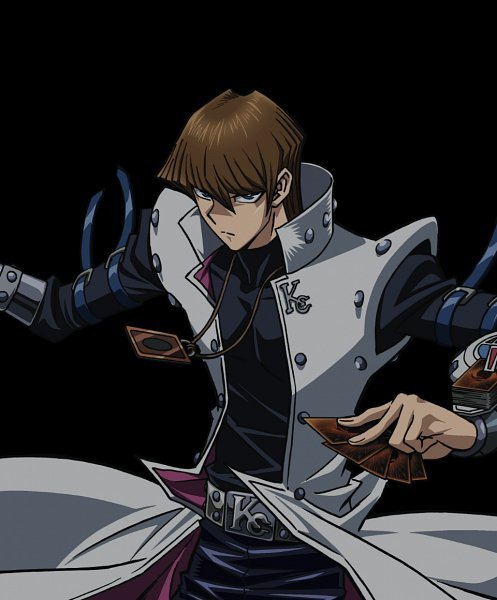
Kaiba is a different manifestation than Yami Bakura of The Challenger. You might even notice that he has the same wing, meaning that their underlying desires and needs are quite similar. This doesn’t mean that they have the exact same priorities or liabilities but that they operate on a subconscious level in a somewhat similar fashion. Somewhat being the operative word.
We know from Mokuba’s account that, even after being orphaned, Kaiba was happier as a child. In spite of ‘getting what he wanted’ in forcing Gozaburo to adopt both Mokuba and himself as a packaged deal, his childhood then became one in which he experienced fairly extreme emotional and developmental deprivation. In grooming him to be the perfect successor and heir for Kaiba Corporation, Gozaburo kept Seto from having the variety of experiences he needed to fully round out his personality. Seto is highly intelligent and well-educated, but he had to emotionally withdraw and harden in order not to grieve his life away over what he wanted to be or what could have been. Instead, he filled the shoes he was expected to fill early as a means of grasping at power over his own destiny and independence from the direct control of his adoptive father.
He is protective of Mokuba, but he is also protective of himself. After all, he had no one else to do it for him. He wants to be self-reliant and to prove that he is strong. Likewise, he does not want to show weakness.
He fixates on winning Duel Monsters and being the best at that because it was one of the things that Mokuba was able to smuggle into him to find some shred of happiness. He wants to make his love of that into a strength so it is worthwhile for him to continue to love such a thing. It may actually be healthy for him to learn to accept that loss or defeat are not weaknesses in spite of being highly skilled and intelligent.
While he is so intelligent, Kaiba reacts based on instinct a lot. His instinctive drive toward some of his personality traits are sometimes at odds with his more cerebral skills and cultivated abilities.
Reactions:
Kaiba’s first impulse is to react based on his gut feeling or primal instinct.
If something separates Kaiba from being his true self, having his basic needs met, or seeing a way forward, his most prominent negative emotional response is likely to be anger/rage.
Stress Point:
When Kaiba is cornered, in a bad mood, hurt, or otherwise driven toward putting up a front, he is likely to display negative manifestations of Type 5 - The Investigator. Kaiba’s particular manifestation of this is becoming arbitrarily or unreasonably skeptical of anything that pushes him outside of his comfort zone or makes him feel a loss of control over his circumstances. He can be a know-it-all, even when he knows better and can see plainly that there is something greater at work. He prioritizes his own usual competence over empirical evidence that is presented to him of the more fantastical elements in his universe. He refuses to feel or acknowledge being helpless, regardless of whether this is the wisest move toward survival, which is uniquely important to him.
Growth Direction:
As Kaiba experiences positive growth, he will become more like Type 2 - The Helper during his times of transition. This could mean that he will learn to value community, friendship, or love more than he allows himself to most of the time. It could also mean that he will do away with skepticism in the face of evidence and that he might be more open to abstract thinking and concepts.
Wing:
I chose Wing Type 7 - The Enthusiast for Kaiba because he is quite acquisitive when it comes to things he is interested in or which help define his sense of identity. He does not care very much about it for image’s sake. It seems that his image, fame, and fortune, are a means to an end for him most of the time. He does not want to feel deprived or out of control. He insulates himself from the very possibility of feeling pain, sometimes by refusing to feel things fully. He also cares about playing a game which he presumably finds fun, even if he cannot quite express that properly. A hobby is a great keystone of his life, which is in line with these personality traits such as seeking sensual pleasure (in the most unattached way possible, to protect himself).
Kaiba Mokuba - Type 6: The Loyalist (6w7)

Mokuba is The Loyalist. This may seem like another potentially lazy, no-brainer choice, but Mokuba’s loyalty to Seto seems to be both a necessary survival mechanism and a genuine part of his personality. He loves his brother very much, and he desires his approval even at his worst. He emulates him at his worst in order to try and mirror what Seto seems to want or need at the time.
Mokuba wants to feel supported and guided by his big brother, and he holds him in high esteem as a person to learn from, even if at times Seto doesn’t live up to being a good role model. However, Mokuba thrives on the opportunity to be responsible and engaged in what is going on around him. Even at his young age, he wants to help his big brother run his company in whatever ways he is allowed. In fact, one might think that in terms of personality he has more aptitude for the job than his brother, even if his brother is a genius.
In spite of often being placed in vulnerable positions, Mokuba doesn’t give up easily, and he feels a sense of commitment to and faith in Seto and, later to some extent, Yugi and his friends.
Mokuba desires reassurance that things are going to work out, and he is willing to work hard to make them turn out okay.
Reactions:
Mokuba’s first impulse is to react based on his thought processes.
If something separates Mokuba from being his true self, having his basic needs met, or seeing a way forward, his most prominent negative emotional response is likely to be fear.
Stress Point:
When Mobuka is cornered, in a bad mood, hurt, or otherwise driven toward putting up a front, he is likely to display negative manifestations of Type 3 - The Achiever. In times like this, he desperately wants to be recognized by his brother and anyone else that would help him feel secure. He is willing to do anything, regardless of how unscrupulous or dangerous, to get back to a sense of security.
Growth Direction:
As Mokuba experiences positive growth, he will become more like Type 9 - The Peacemaker during his times of transition. This could mean that he will feel more secure without needing constant reassurance. He may become more able to accept what is without the need for it to be externally affirmed that it is safe and that he is accepted and moving along the right path. He may also encourage social harmony with others.
Wing:
I chose Wing Type 7 - The Enthusiast for Mokuba because he desires happiness openly as part of his need to feel secure. He doesn’t want to miss out on being included in his brother’s life, or in any of the exciting things going on around him, even if it requires him to grow up fast and experience considerable peril, at odds with his desire for safety.
Marik Ishtar - Type 2: The Helper (2w3)
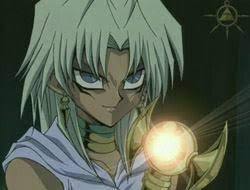
And I’ll prove it! “Regular” Marik is a traumatized individual, and we had a front-row seat to some of it in canon. Because of this, it was hard to identify the “core” of his personality. The way I did this with the Enneagram system was to consider Yami Marik an independent soul/personality which was a direct manifestation of Marik’s trauma, repressed feelings, and stress response. Working backward, a person who behaves like a Type 8 primarily when stressed is probably a Type 2. Therefore...
Marik is the Helper. It may sound crazy, but this has to do with what Marik values deep down. What does he want? What did he need, whether he got it or not?
Marik wanted to be loved by his family. Marik wanted to experience community and the outside world. Marik wanted his siblings’ friendship and love for him and each other to be functional and rewarded with the just rewards of having such positive feelings. However, his hopes and needs were dashed at every point, except that his adoptive brother remained loyal to him even as his mental health fell apart and literally splintered into two people. Sometimes, love isn’t enough, as they say.
If only it were this easy to fix mental health and trauma issues in the real world, but after Marik realizes what is important to the world and to his own identity, he is able to banish, destroy, or subdue “Yami Marik” - a kind of pseudo personality of his or an aspect of himself that was his worst - and return to being quite a seemingly happy and balanced person who wants to start again and do his best to rebuild his life and family.
Reactions:
Marik’s first impulse is to react based on his emotions.
If something separates Marik from being his true self, having his basic needs met, or seeing a way forward, his most prominent negative emotional response is likely to be shame. (This explains why he repressed so hard that Yami Marik formed, possibly.)
Stress Point:
When Marik is cornered, in a bad mood, hurt, or otherwise driven toward putting up a front, he is likely to display negative manifestations of Type 8 - The Challenger. However, he did his best to dissociate and repress these feelings due to his horror at his own actions and his grief at the fact that his most basic needs were denied in a systematic way during his upbringing. See below for further analysis of his “Stress Personality,” which somehow, because anime, gained its own soul or independent manifestation of sorts.
Growth Direction:
As Marik experiences positive growth, he will become more like Type 4 - The Individualist during his times of transition. This could mean that he will finally feel loved and worthy of love and be able to move on to the development of an independent identity that is based on what he wants and needs, rather than the legacy and trauma of his past and family history.
Wing:
I chose Wing Type 3 - The Achiever for Marik because he is driven and image-conscious. I mean, look at him. He also wants to be recognized for his abilities, successes, and needs and wants.
Yami Marik - Type 8: The Challenger (Sort of.)
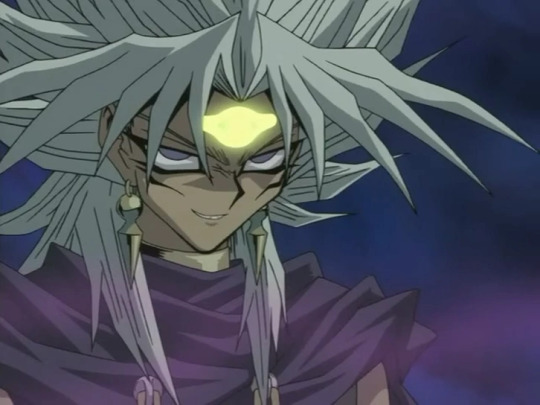
Yami Marik is the Challenger.However, he is not a whole person or a proper entity apart from Marik. Instead, he is Marik’s darkest traumas, reactions, and repressions made manifest as a different form. This means that he is a “Stress Personality” of sorts with fairly singular, obsessive focus on lashing out.
Reactions:
Yami Marik’s first impulse is to react based on his gut feeling or primal instinct.
If something separates Yami Marik from being his true self, having his basic needs met, his single-minded goals, or seeing a way forward, his most prominent negative emotional response is likely to be rage/anger.
Stress Point:
Yami Marik is the “Stress Point” along the “stress line” for Marik, so he is already doing this all the time.
Growth Direction:
Yami Marik cannot experience positive growth due to the nature of his/its existence. However, if he were, he would become more like Type 2, which is actually what Marik is anyway. This doesn’t always work out in the Enneagram system, but it does in this case.
Wing:
He doesn’t have a wing because he is very single-facet.
Odion Rashid Ishtar - Type 6: The Loyalist (Insufficient Data)

We don’t know a lot about Rashid, who for some unfathomable reason was renamed Odion in the dub. It is difficult to do a full profile for him, but based on what we have seeen, we can tell surprisingly more than one might expect.
Rashid is the Loyalist. He was willing to tolerate abuse from his adoptive father, and in spite of the way he was treated, he harbored no resentment toward his adoptive siblings when they came along, in spite of their existence making his prospects even worse. Even if it was a misguided effort, he remained loyal to Marik and by his side even as he seemed to go mad and went on a crazy quest for revenge. He never rejected Marik.
It would seem that, as a Type 6 and the ‘older brother,’ in his position, he found a way to create his own sense of security through relying on the acceptance of his adoptive mother, even after she died. He created his own sense of responsibility toward his siblings, Marik in particular. He resisted anxiety and insecurity in every way he could.
Reactions:
Rashid’s first impulse is to react based on his thought processes.
If something separates Rashid from being his true self, having his basic needs met, or seeing a way forward, his most prominent negative emotional response is likely to be fear.
Stress Point:
When Rashid is cornered, in a bad mood, hurt, or otherwise driven toward putting up a front, he is likely to display negative manifestations of Type 3 - The Achiever. He was willing to do Marik’s dirty work or to complete any task for his ‘adoptive father’ in order to obtain the sense of security and fulfilled responsibility that he needs to feel comfortable in his skin. He spent his whole life being desperate to be acknowledged for his efforts.
Growth Direction:
As Rashid experiences positive growth, he will become more like Type 9 - The Peacemaker during his times of transition. We even witness his willingness to move in this direction when he helps Marik make “peace” with himself and his demons/defeat Yami Marik.
Wing:
This is the part I cannot determine for Rashid because of how much he shaped himself around Marik’s needs when we observed his behavior.
Isis Ishtar - Type 9: The Peacemaker (9w8)
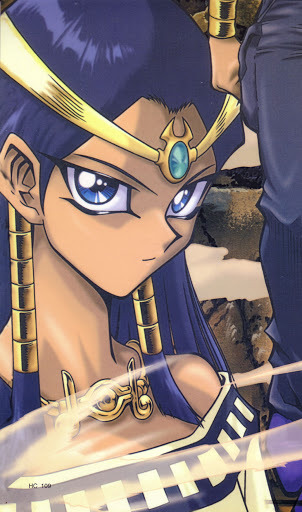
Isis (Ishizu makes no sense, it’s katakana for Isis) is the Peacemaker. It sounds great, but Type 9 has positives and negatives just like all the other personality Types. It’s great that she wants to create or facilitate harmony, peace, and social cooperation. However, she also accepts that this may involve people adhering to traditional expectations even if they go against what an individual wants or needs.
It may be due in part to her possession of the Millennium Necklace which allows her to see the future (???) sometimes, but it would seem that Isis is uniquely capable of accepting what is, no matter how bad of adverse. She does want her family to survive and to be at peace, but she also did not have the innate desire to resist against the unfair aspects of their upbringing that Marik wanted to push back against. She may value peace over freedom or independence, and she feels a responsibility toward the collective and the world.
Reactions:
Isis’s first impulse is to react based on her gut feeling or primal instincts.
If something separates Isis from being her true self, having her basic needs met, or seeing a way forward, her most prominent negative emotional response is likely to be anger/rage. She doesn’t seem to reach this point very often, though, due to her strong acceptance of the status quo.
Stress Point:
When Isis is cornered, in a bad mood, hurt, or otherwise driven toward putting up a front, she is likely to display negative manifestations of Type 6 - The Loyalist. While she cares about the emotional well-being of herself and others, she was willing to try and find the greatest possible measure of it under the unjust rule and abuse of her father toward herself and her brothers, for example.
Growth Direction:
As Isis experiences positive growth, she will become more like Type 3 - The Achiever during her times of transition. This could mean that she will begin to differentiate her own accomplishments from her responsibilities and sense of peace or calm. She may begin to care more about being loved/liked as she enacts what she sees as her role in life and to achieve things which are not solely related to her purpose in the way she thinks things will proceed.
Wing:
I chose Wing Type 8 - The Challenger for Isis because she is accustomed to if not particularly interested in a sense of control or power. Even when this was pretty demonstrably not the case, her stewardship of the Millennium Necklace gives her the confidence to proceed as though it just is-what-it-is while also pushing others to fulfill their appropriate role.
Kujaku Mai - Type 3: The Achiever (3w4)
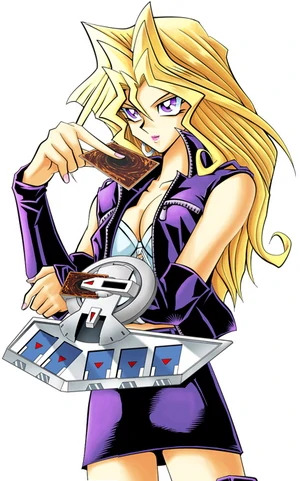
Mai is the Achiever. She wants to be distinguished from the crowd. She values and cultivates her physical appearance, and she uses it to achieve her goals among any other tool in her arsenal. She wants to be successful at almost any cost. While she can have warm feelings and value doing the right thing, she has experienced enough disappointment, alienation, and abandonment to feel that she has been worthless to other people. She tries to turn that sense around and to devalue what others mean to her to protect herself.
Mai enjoys the admiration of others because it makes her feel that her worth is being acknowledged. She often likes to do this in ways that make it difficult for her admirers to “take away” their approval, often being the first to “leave” the spotlight until the next time she needs positive affirmation.
Reactions:
Mai’s first impulse is to react based on her emotions.
If something separates Mai from being her true self, having her basic needs met, or seeing a way forward, her most prominent negative emotional response is likely to be shame.
Stress Point:
When Mai is cornered, in a bad mood, hurt, or otherwise driven toward putting up a front, she is likely to display negative manifestations of Type 9 - The Peacemaker. For example, if she feels guilty about the ways in which she protects her emotional well-being which might be considered unfair to others, the unhealthy way for her to respond would be to put on a front of whatever she needs to do to restore immediate personal harmony without dealing with the core of her issues.
Growth Direction:
As Mai experiences positive growth, she will become more like Type 6 - The Loyalist during her times of transition. This could mean that she will become more deeply committed to friends, loved ones, or values or causes. It could mean that she will develop a more centered sense of responsibility toward something that is important to her. It would mean that she would be working toward finding and valuing a sense of security.
Wing:
I chose Wing Type 4 - The Individualist for Mai because she is certainly the kind of person who enjoys being independent. This can exist whether or not she is mentally healthy about it! She has a strong sense of the image she wants to cultivate, both in her physical appearance and fashion choices and the other types of aesthetic beauty she places around herself. She finds something satisfying about the “harpy” image and themes her deck around it for example. She consciously chooses and creates her image and identity.
Otogi Ryuji - Type 7: The Enthusiast (7w8)

Ryuji is the Entuhsiast. He obviously doesn’t mind the attention he receives for the way he presents himself aesthetically. He is considered attractive, knows it, and enjoys himself. His concern with his physical appearance is probably owed to the external benefits more than being primarily about a personal draw to an aesthetic. He is willing to change with the circumstances, expectations, or opportunities around him. He is interested in new, exciting experiences.
He values being satisfied and content and, conversely, fears pain and deprivation.
When he is first introduced to Yugi and the others, he is determined to get vengeance for his father’s loss of his business (or the loss of Pegasus business deal, depending on source). However, he is fairly easily persuaded to change his mind. This could be a positive or negative trait, but he is open-minded almost all the time.
He enjoys sensual pleasure, but that doesn’t necessarily have to be kinky. That’s one reason I chose the above picture for him: he seems to be good at and enjoy cooking!
Reactions:
Ryuji’s first impulse is to react based on his thought processes.
If something separates Ryuji from being his true self, having his basic needs met, or seeing a way forward, his most prominent negative emotional response is likely to be fear.
Stress Point:
When Ryuji is cornered, in a bad mood, hurt, or otherwise driven toward putting up a front, he is likely to display negative manifestations of Type 1 - The Reformer. He forms quick, fast opinions about what the way to make something right is, whether or not he has all the information. He acts impulsively to mete out personal justice without looking at the big picture.
Growth Direction:
As Ryuji experiences positive growth, he will become more like Type 5 - The Investigator during his times of transition. This could mean that he take more careful consideration in forming his opinions. Being open-minded is great, but being too quick to act on a whim or firm up a plan can often get someone like Ryuji into trouble.
Wing:
I chose Wing Type 8 - The Challenger for Ryuji because he is assertive and enjoys the respect of others. He also values protecting who and what is important to him.
Aaaand we’re finished for now!
This post is really long, and it took me at least 12 hours of research, writing, and consideration to make. I hope you like it and that it might even be useful for you in creating YuGiOh fic!!! It is fine if you don’t agree with every point and even if you discuss it with me, but please don’t yuck my yum and insult my hard work to entertain and help you.
If you’re an adult, please consider buying this unemployed-for-over-a-year and about-to-move-for-a-new-job person a kofi.
It would also be a great form of free support for you to check out my Yu-Gi-Oh fic on AO3 and leave some feedback!
Or leave positive feedback on this post, in your tags, or whatever, here!
#yugioh duel monsters#yugioh#kaiba seto#mutou yugi#ygo bakura#bakura#yami bakura#bakura ryou#mazaki anzu#anzu mazaki#katsuya jounouchi#jounouchi katsuya#hiroto honda#honda hiroto#yami yugi#atem#pharaoh atem#marik ishtar#isis ishtar#rashid ishtar#seto kaiba#mokuba kaiba#kaiba mokuba#ygo dm#ryou bakura#kujaku mai#mai kujaku#ryuji otogi#otogi ryuji#yami marik
87 notes
·
View notes
Photo

#yugioh#marik ishtar#malik ishtar#odion ishtar#rishid ishtar#rashid ishtar#ygo#manga edit#meme crop#blog
184 notes
·
View notes
Photo

Our Family
#marik ishtar#ishizu ishtar#isis ishtar#odion ishtar#scribz#yugioh#ygo#yu gi oh#ygo dm#yugioh dm#duel monsters#i love this family sm i hope they were alright in the end#rishid ishtar
93 notes
·
View notes
Photo

Fixed colors the color. the first time i uploaded it Tumblr fucked up the colors. SO here enjoy this hard to find poster. you have no idea how hard i looked for it.
5 notes
·
View notes
Note
Alright, so, it took me approximately the length of time Atem was in the puzzle to find the original reason Anon sent you this ask, and I wanted to explain a bit more. For record, my credentials are: long-time YuGiOh fan, casual studier of languages who knows an extremely small amount about Japanese. Also, I taught English to Japanese university students in Japan for a while, and one of our lessons was on how to distinguish between the R and L sound. It’s one of those days you spend laughing because when you try to convince them you’re saying a different word between “rice” and “lice” or “grasses” and “glasses,” they initially think you’re trying to run a psy-op on them.
In Japanese, R/L is the same sound. It’s not so much that one or the other doesn’t exist as that the ways you make this sound are, like, ら (ra)、り(ri)、る(ru)、れ (re)、ろ(ro). This is usually how they are transcribed into English, but it would be just as accurate to write them as “la, li, lu, le, lo.” Most of the time, to Anglophone ears, it sounds like a “soft R,” not very “rhotic” (or “growly”), but there are cases where it very much sounds like an “L.” I’m not sure what causes this unless it’s just neighboring sounds, but many EFL Japanese people will say they “wear grasses” (meaning they wear glasses). It’s sort of like a very softly rolled “R” sometimes.
What I had to do was to teach them to feel their throats and sort of pretend to growl to “find” the sound that defines English’s fairly rhotic R. Then I had them practice putting their tongues on the roof of their mouths to do “La, La, La” to “find” the L sound. Then we practiced. ANYWAY, to get back to the point:
“Marik” and “Malik” are both equally correct in Japanese because they’re the same sound and it’s just a matter of preference in how one transcribes/hears it in Japanese. The way to “tell” what is right to your ear would be to listen to the Japanese audio and see which it “sounds like” to you.
That said, “Marik,” pronounced in an American English accent, probably “sounds better,” because we’re pronouncing it Mar-ik” with a short “i” like “lick,” which makes it ‘sound weird,’ if we do it more “L” instead. I go with “Marik” basically always for this reason, even though it probably is the ‘less correct’ of the two. It’s sort-of-Arabic -> Japanese -> English, which makes what is “right” tricky. There is no (as far as I’m aware!) Arabic name that directly corresponds with using an “R” in the middle. Instead, “Malik” is a real name in Arabic and other Semitic languages, but it “sounds weird” in English because languages have sounds that typically “go together” and to use “rik” sounds more name-y than “lik.” I could be wrong, but I think there’s a correct way it could be pronounced ‘Malique” sort of when written as Maliq, but again it’s a matter of transliteration. Oh, and just in case it wasn’t clear, while the Ishtar family knows Ancient Egyptian Language, Arabic is the primary language in modern-day Egypt.
As an aside, this is why it also makes no sense to call Isis Ishtar “Ishizu” apart from weebery or habit. When you write a foreign name in Japanese, you use katakana, but because Japanese uses a syllabic instead of an alphabetic system, you are limited in terms of spelling to the sounds that exist in that syllabary, and there are certain sounds - especially terminal consonants - that you “can’t make” in Japanese even if individual Japanese people can figure out how to say them the way they sound in the language of origin. It’s sort of like how English doesn’t have ñ but you can figure out how to pronounce it with the original Spanish inflection if you see the word “Montana.”
“Ishizu” is literally just “Isis” being written in Katakana (イ(i)シ(shi)ズ(zu)) because it’s the “close enough” spelling of it in Japanese script.
ALSO, ALSO, it blew my mind that they changed their adoptive brother’s name from “Rishid” to “Odion” in English, much further away from the intent. “Rishid” also isn’t really a name, but there is “Rashid.”
Sorry if this comes off as being a know-it-all. I just found it interesting.
With Marik/Malik it's honestly just up to personal preference, since in the subs it's not much of a difference between the pronounciation of L and R due to one of them not really existing in the Japanese language if I remember correctly? But in the dub it's just Marik and Yami Marik.
(Fun fact Yami actually means dark, the reason Yami Yugi is called that is due to him originally being a malevolent but helpful spirit in the manga, he got better though so it's fine)
that's what i thought tbh, with the marik/malik thing. marik sounds better to me so i prefer that tho
3 notes
·
View notes
Note
Malik
"No, you listen to me. I don't have time for this bullshit." Malik spat into the phone. "We have a shipment coming in one hour. That means I need you to be here in ONE hour. I don't care how you do it." He hung up the phone and flopped dramatically into his chair. "Why does no one fucking listen to me?" He grumbled at the ceiling. "Malik, are you feeling alright?" Ishizu asked poking her head into the room. "Oh yeah, just perfect. The shipment is going to be late, which means it won't get set up in time, which means we won't open on schedule." "Is that all?" She asked. "Nothing else is feeling...off with you?" "I'm fine." He snapped, and then sighed. "I'm fine, I promise. There is no psychopath screaming at me to kill everyone I know." "Okay...Just...let me know if you need anything." "What I need is to get out of this place." He whispered and it rang so true Malik sat up. "I don't want to be here." He tested the words out loud. He stood up. "I don't want to be here." A little louder this time. "I DON'T WANT TO BE HERE!" So don't be here then.
Malik could hear Bakura's voice in his soul. In his heart and in his mind. "Don't be here then." He nodded. "Right. Okay." He would work this last exhibit, because he had already promised his sister he would be there, but after that, he was going to find his own way. He needed to. He needed this. Soon he would be free.
#malik ishtar#duuuude I like this#This is before he decides to fuck off from Ishizu and Rashid#ore no turn: answered ask#thanks for the ask!
4 notes
·
View notes
Text

MERRY CHRISTMAS to @kurahii via me, your secret Santa, hello, in participation with @yugiohsecretsantaevent
Here’s some quasi-modern domestic Ryou & Marik exchanging gifts while Isis admires & Rashid bakes cookies. Hope your holiday is great, my friend, and I hope you enjoy this!
#yugioh#yugiohsecretsantaevent#marik ishtar#ryou bakura#isis ishtar#rashid#synchro speaks#synchro art
119 notes
·
View notes
Photo

A Neo-Babylonian plaque depicting the head of the demon Pazuzu looking over various animal-headed beings. At the bottom is the demoness Lamashtu known for attacking children and babies. Mesopotamian women wore amulets and had plaques like this one depicting Pazuzu to protect their children.
If you look closely under Pazuzu’s head you can see the star symbol of Inanna/Ishtar.
The book from which the picture is from is Markham J. Geller’s Evil Demons: Canonical Utukku Lemnutu Incantations. The picture itself is from the twitter of Dr. Moudhy Al-Rashid.
~Hasmonean
#books#demons#pazuzu#lamashtu#lamastu#lilith#ane#ane studies#ancient near east#demonology#mesopotamia#mesopotamian#women#babylonian#gods and goddesses#gods#goddesses#animals
239 notes
·
View notes
Photo


Trans flag but it’s color picked from Odion Ishtar!
70 notes
·
View notes
Photo
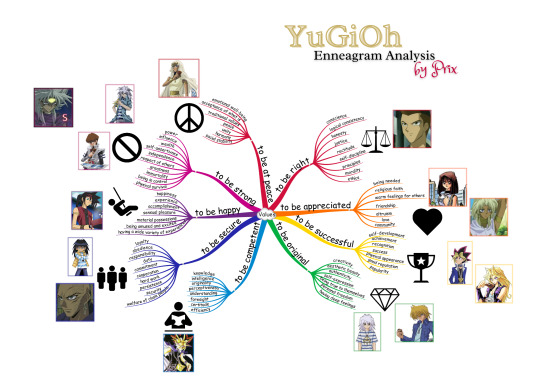
[ID: A chart describing the core values of each of the nine Enneagram personality types with YuGiOh characters correlated to each of the types.]
YuGiOh Enneagram Analysis, Part #1
Please note that this is the “boring” informational post about Enneagram with the Types listed and explained as well as a few other things. The next post is what has the actual, in-depth character profiles promised!
Introduction & Motivation
Over the past several months, I have been trying to analyze my strengths and weaknesses as a writer and learn more. I have been writing fanfiction since I was a little kid, making my first FF.net account in 2003 when I would have been twelve years old. Even before that, I was a lurker and wrote fics to share with my childhood best friend on paper or floppy discs.
YuGiOh came into my life at some point shortly thereafter. I know this, because I spent my thirteenth birthday in a comic book shop, mostly watching some of my male friends play the trading card game. I had some of the cards, but I was never much of a player, unable to keep up with the seemingly rapid rule changes. Besides that, I was always way more interested in the story and characters than I was in the card game. I remember I even wanted to call “YuGiOh cards” “Duel Monsters” instead to make it seem a little closer to tween-y LARPing.
Eventually, I gave up on collecting cards or trying to ply the game. I felt that while my male friends didn’t mind me being around when they played, they weren’t extremely interested in helping me learn or keep up. I felt I had other strengths, so I started carrying around a notebook even more than I already did. I started my fledgling forays into online fandom. And YuGiOh was a big part of the beginning of that.
I can’t remember posting any YuGiOh fic in particular, and I’m sure that if I had it would make me cringe now. What I do remember is reading some and also spending a lot of time lying on my bed, headphones plugged into a small purple stereo, listening to the first of the two American-released CDs with YuGiOh-inspired music on them. In particular, the last three tracks were pieces of music from the original score composed for the 4Kids dub, which is - for some reason - different from the original Japanese music.
During that time, I would fantasize and conjure my own YuGiOh plots in my head, most of which were focused on the Ancient Egyptian and more spooky, spiritual, and horror themes in the show. I was really fascinated with the reincarnation angle, though my understanding of and opinions on how that works have grown with time.
Years went by, and I didn’t think about YuGiOh much at all. Then, something happened in 2018. I don’t know what got in my head, but it was like all the joy I once found in thinking about the YuGiOh characters came back in a giddy conversation with my childhood best friend. Then, for a little while, it wouldn’t leave me alone.
I started writing for the fandom then, and after several detours, I’m trying to get back in the groove of it.
My approach to the tone of YuGiOh-fanning is that it’s a bit serious, but it’s also with a tongue placed in my cheek because of how incomprehensible or silly the plot can be on a meta level. Sometimes, it almost brings tears to my eyes by being so over-the-top about something that, in the real world, would make no sense at all. But the drama, in the context of the universe, somehow rings true.
I think that’s all owing to how most of the primary characters are just... really freaking great characters.
It has often puzzled me. Like, did Takahashi do all this layering on purpose? Is it really there, or did earnest fanon just make it seem like it? And, as a person, I am always here for a good fan-and-canon symbiosis.
This post is going to be, from here on, an effort to match the YuGiOh characters to the 9 Enneagram Personality Types. I am writing this for my own benefit as I continue to work on my pet YuGiOh fanfiction project, It’s Always Sunny in Domino City, which is a mixture of YGOTAS-vibes-and-concepts taken seriously and a sincere take on fanfiction for the actual canon. It’s dramedy about a sizeable chunk of the main cast a few years post-canon with some canon divergence such as the Memory World arc not yet and possibly never-happening. If that sounds like something you’d like, I would humbly request you check it out!
Either way, this will be an in-depth character analysis cheatsheet for all of the characters above, based on my observations, opinions, and feelings. I invite discussion, but it’s fine if we need to agree to totally disagree!
If you are interested and enjoy what’s below the Read More and in the coming second post, then you are welcome to utilize the character analyses to aid you in your own fanwork!
Enneagram
What is Enneagram, and why am I using it?
Enneagram is a personality categorization system that one might compare to the somewhat better-known MBTI. However, in the words of excellent writing-advice YouTuber, Abbie Emmons:
MBTI shows us how we behave.
Enneagram shows us what we believe.
I will be referencing Abbie’s video Using The ENNEAGRAM To Write CONFLICTED CHARACTERS and her free Enneagram-cheatsheet, available in the description of the linked video. Whether it’s before you continue reading or after, if you’re interested in writing, I would highly recommend you check out her channel!
The Enneagram system has nine basic personality types that overlap and interact in really interesting ways. It is not a hard science, and it’s not a horoscope. Instead, it’s supposed to be “based on conventional wisdom and modern psychology.” All I can say is that with every set of characters I’ve tried it with, it works! Once you get the hang of it, it feels kind of like ~✰~magic~✰~!
Below, I will list Abbie’s simplified definitions of each of the personality types, in order:
Type 1: The Reformer
The Rational, Idealistic Type:
Principled, Purposeful, Self-Controlled, and Perfectionistic
Basic Fear: Of being corrupt/evil, defective
Basic Desire: To be good, to have integrity, to be balanced
Key Motivations: Want to be right, to strive higher and improve everything, to be consistent with their ideals, to justify themselves, to be beyond criticism so as not to be condemned by anyone.
Type 2: The Helper
The Caring, Interpersonal Type:
Generous, Demonstrative, People-Pleasing, and Possessive
Basic Fear: Of being unwanted, unworthy of being loved
Basic Desire: To feel loved
Key Motivations: Want to be loved, to express their feelings for others, to be needed and appreciated, to get others to respond to them, to vindicate their claims about themselves.
Type 3: The Achiever
The Success-Oriented, Pragmatic Type:
Adaptable, Excelling, Driven, and Image-Conscious
Basic Fear: Of being worthless
Basic Desire: To feel valuable and worthwhile
Key Motivations: Want to be affirmed, to distinguish themselves from others, to have attention, to be admired, and to impress others.
Type 4: The Individualist
The Sensitive, Introspective Type:
Expressive, Dramatic, Self-Absorbed, and Temperamental
Basic Fear: That they have no identity or personal significance
Basic Desire: To find themselves and their significance (to create an identity)
Key Motivations: Want to express themselves and their individuality, to create and surround themselves with beauty, to maintain certain moods and feelings, to withdraw to protect their self-image, to take care of emotional needs before attending to anything else, to attract a "rescuer."
Type 5: The Investigator
The Intense, Cerebral Type:
Perceptive, Innovative, Secretive, and Isolated
Basic Fear: Being useless, helpless, or incapable
Basic Desire: To be capable and competent
Key Motivations: Want to possess knowledge, to understand the environment, to have everything figured out as a way of defending the self from threats from the environment.
Type 6: The Loyalist
The Committed, Security-Oriented Type:
Engaging, Responsible, Anxious, and Suspicious
Basic Fear: Of being without support and guidance
Basic Desire: To have security and support
Key Motivations: Want to have security, to feel supported by others, to have certitude and reassurance, to test the attitudes of others toward them, to fight against anxiety and insecurity.
Type 7: The Enthusiast
The Busy, Variety-Seeking Type:
Spontaneous, Versatile, Acquisitive, and Scattered
Basic Fear: Of being deprived and in pain
Basic Desire: To be satisfied and content—to have their needs fulfilled
Key Motivations: Want to maintain their freedom and happiness, to avoid missing out on worthwhile experiences, to keep themselves excited and occupied, to avoid and discharge pain.
Type 8: The Challenger
The Powerful, Dominating Type:
Self-Confident, Decisive, Willful, and Confrontational
Basic Fear: Of being harmed or controlled by others
Basic Desire: To protect themselves (to be in control of their own life and destiny)
Key Motivations: Want to be self-reliant, to prove their strength and resist weakness, to be important in their world, to dominate the environment, and to stay in control of their situation.
Type 9: The Peacemaker
The Easygoing, Self-Effacing Type:
Receptive, Reassuring, Agreeable, and Complacent
Basic Fear: Of loss and separation
Basic Desire: To have inner stability, "peace of mind"
Key Motivations: Want to create harmony in their environment, to avoid conflicts and tension, to preserve things as they are, to resist whatever would upset or disturb them.
Now that you’ve seen all those, what do you think your favorite character is? In YuGiOh or anything else! It works great for original characters and even yourself and your loved ones.
The actual Character Profiles will be in coming post(s), but continue reading if you want me to explain more about how and why the Enneagram is a great personality typing system. #nonspon, or whatever.
The Enneagram Chart
Now, you could just go to the Enneagram Institute’s page on How the System Works, but below I’ll cut it down to only the parts I’m interested in and explain those in a way that helps me.
Unlike in astrology or MBTI, which are both more restrictive in different ways, the relative position of each type matters a bit on the Enneagram chart, because it can be used to visualize a lot of things about a person!
The Basic Chart
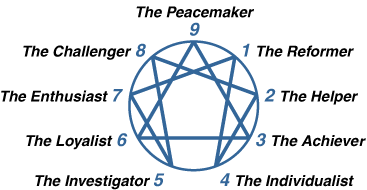
The Types are shown in a clockwise fashion with “1″ in the 1 o’clock position on an analog clock. The interior lines mean things, but I have trouble reading it without further delineation.
Centers of Response
Below are two small charts, displayed side-by-side. (If it’s too small, try right-click, open in new tab!)
The chart on the left shows the three “centers.” The “centers” indicate the first ‘processing language’ a person would use to respond to stimuli.
Type 8, Type 9, and Type 1 respond first based on instinct (primal, gut-feeling). If you want to go Freudian, this is from the id.
Type 2, Type 3, and Type 4 respond first based on feelings (social or personal desires, the heart). If you want to go Freudian, this is from the ego.
Type 5, Type 6, and Type 7 respond first based on thoughts (analytical rather than emotional, the head). If you want to go Freudian, this is from the superego.
Remember that, of course, every single type and person engages their instincts, their emotions, and their thoughts at different times and to different degrees, and some of these are learned or changed behaviors. This is about what their innate drive toward that would be.
Likewise, the same “centers” can also be used for the chart on the right. You will notice that all three of these are defined by what is typically considered a negative emotion. This is because this is about a person’s instinctive, not particularly conscious emotional response when they are backed into a corner and deprived of something that is core to the needs of their personality type.
Type 8, Type 9, and Type 1 tend to respond to a threat to their psychic well-being with anger/rage.
Type 2, Type 3, and Type 4 tend to respond to a threat to their psychic well-being with shame.
Type 5, Type 6, and Type 7 tend to respond to a threat to their psychic well-being with fear.

Stress vs. Growth
We all know that there are times when a person isn’t acting like themselves, for better or for worse. Usually, “You’re not acting like yourself,” means that a person is behaving badly. Of course, it’s way easier to withdraw and bristle and defend rather than growing in the midst of adversity. However, it is certainly possible to experience character growth in response to experiences, good and bad. Unlike a lot of other personality typing schemes, the Enneagram has a way to display and predict what stress and growth do to a person.
The Enneagram never suggests that any Type is an island unto itself. Every person contains multitudes, but a person’s Type is likely to remain relatively stable throughout their lives, once they have had a chance to develop any personality at all. This means that when a person is stressed or growing that they do not become the type they emulate. Rather, they are more highly expressing that aspects of their personality that reflect those drives and desires but in a way that is either fraught, sickly, or unwell (in the case of stress), or aspirational, flying-high, and incorporating the hard-lessons into who a person is going to be going forward (in the case of growth). The latter, especially, isn’t a sustainable mode, while a stressed person can become more entrenched in their bad habits and defensive coping mechanisms.
Stress
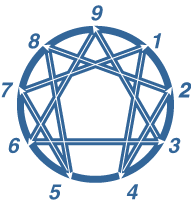
Note the white, directional arrows. Each number has an arrow point pointing to it and an arrow leading away from it. The point indicates that this is the stress manifestation for the Type at the origin of that arrow. The origin of each arrow indicates the Type being described.
Confused? Let me finally give you a YuGiOh example.
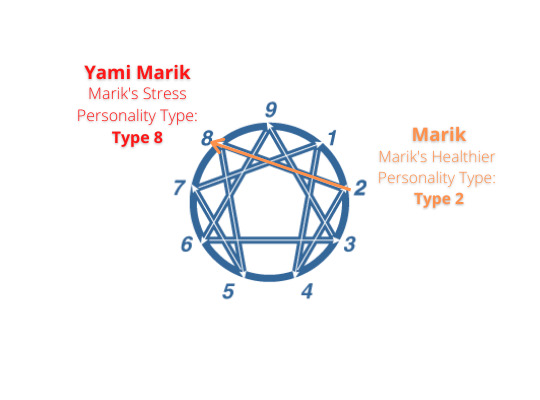
When I was trying to identify the Types of the characters, defining Marik was difficult, because he has a “Yami,” or Dark Side, which has its own personality and will but which is not its own separate soul or person than Marik himself. Rather, it’s a kind of fantasy/magic-assisted personality splintering where Yami Marik is a full manifestation of the negative traits Marik needed to embody to survive.
So, for reference:
When stressed, Type 1 behaves more like Type 4.
When stressed, Type 2 behaves more like Type 8.
When stressed, Type 3 behaves more like Type 9.
When stressed, Type 4 behaves more like Type 2.
When stressed, Type 5 behaves more like Type 7.
When stressed, Type 6 behaves more like Type 3.
When stressed, Type 7 behaves more like Type 1.
When stressed, Type 8 behaves more like Type 5.
When stressed, Type 9 behaves more like Type 6.
Alternatively, you can use these sequences to follow the stress lines:
1-4-2-8-5-7-1
9-6-3-9
Growth
Think of the above-explanation in reverse.
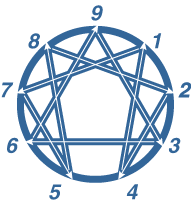
The sequence:
1-7-5-8-2-4-1
9-3-6-9
As a Type 1 grows, they incorporate more positive traits of Type 7.
As a Type 2 grows, they incorporate more positive traits of Type 4.
As a Type 3 grows, they incorporate more positive traits of Type 6.
As a Type 4 grows, they incorporate more positive traits of Type 1.
As a Type 5 grows, they incorporate more positive traits of Type 8.
As a Type 6 grows, they incorporate more positive traits of Type 9.
As a Type 7 grows, they incorporate more positive traits of Type 5.
As a Type 8 grows, they incorporate more positive traits of Type 2.
As a Type 9 grows, they incorporate more positive traits of Type 3.
Wings
The final thing to know about the Enneagram chart for my purposes is about wings. The wing of your personality traits accounts for the complementary and contradictory aspects of your personality. They are the inconsistencies that make you human, predicted and jumped in. Typically, a person is not thought to have both possible wings but one or the other. A wing is one of the two adjacent Types to yours, the number before, or the number after, and it is annotated, for example:
Type 1, Wing 2: 1w2
Type 1, Wing 9: 1w9
Link to Part 2 Here!
#yugioh#yugi mutou#seto kaiba#jounouchi katsuya#yugioh duel monsters#mutou yugi#kaiba seto#kaiba mokuba#mokuba kaiba#kujaku mai#mai kujaku#anzu mazaki#mazaki anzu#katsuya jounouchi#marik ishtar#isis ishtar#rashid ishtar#hiroto honda#honda hiroto#ryou bakura#bakura ryou#yami bakura#yami marik#yami yugi#pharaoh atem#atem#ryuji otogi#otogi ryuji#main cast#op
37 notes
·
View notes
Note
you refer to Ishizu as Isis? Does that mean Ishizu is a translation error or...?
Fun facts about the Ishtar sibling names!
As I said before, this is a triple-threat language collision.
Kazuki Takahashi gave the Ishtar siblings legit Egyptian/Arabic names: Isis is an Ancient Egyptian goddess, Malik means king or lord in Arabic, and Rishid is a form of Rashid.
But he was working in Japanese, so he transliterated the sounds into katakana. Japanese has a comparatively limited set of sounds, so when foreign words are adopted or translated into Japanese, they’re also adjusted so they can be spelled in katakana (one of the three alphabets Japanese uses, and the one used for foreign loanwords or translated words). Icecream in Japanese is a loanword spelled アイスクリーム; aisukuriimu, but “u” can be very soft in Japanese so pronounced ais’k’reem’.
(Note: this also happens in any language that doesn’t line up perfectly in alphabet and phonemes with another. For example, the Ancient Egyptian word for the sun god was actually probably pronounced something more like “rh-ee-ah-[gk]” and is pronounced that way in modern Egyptian Arabic, which shares phonemes with Ancient Egyptian that aren’t shared with English. So in English, we just say “rah”. English pronunciations aren’t infallible either.)
SO
Isis, in English (aɪsɪs) eye-siss, was transliterated into Japanese as イシズ, ee-shee-z(u). Malik (mah-leek) was transliterated as マリク, mah-ree-k(u). Rishid, I believe, was transliterated as リシード, ree-shee-doh.
THEN
The team in charge of the dub, for some reason* decided, rather than transliterate the original Arabic directly to English, they would just transliterate from Japanese to English. It’s like a game of telephone. Isis -> イシズ -> Ishizu. イ is transliterated into romaji as “i”, シ as “shi”, and ズ as “zu”, so the non-name イシズ (ee-shee-z’) became the even-less-of-a-name Ishizu (ih-shee-zuu). Malik became Marik (via ma-ri-ku) because Japanese doesn’t distinguish between L and R in the same way as English does; they’re both an alveolar tap in Japanese whereas English has multiple distinct sounds for those letters.
*The reason may have been ignorance, but it’s likely to have been Islamophobia. They completely ditched “Rishid” and named him Odion, which is still an African name, but not an Arabic one. But the vagaries of the dub names are mysterious at the best of times.
(Priestess Isis gets a slightly closer katakana rendering of her name and consequently (?) a closer English equivalent. It’s not known if that’s because Kazuki Takahashi intended them to have different names or just wanted to improve on his previous version. She’s アイシス: Ai-shi-s’.)
So yes, Ishizu is not so much a translation error as an artifact of translation. I think Kazuki Takahashi intended to name her “Isis” and I think Isis is a gorgeous name with a long and beautiful history. So I use it.
#thanks for the ask#ishizu ishtar#marik ishtar#ishtar siblings#I tag them as their more commonly-used names#sparklefists answers questions about ygo#hello anon#Anonymous
384 notes
·
View notes